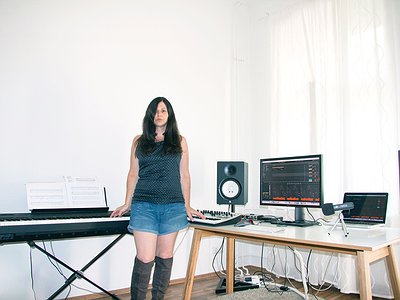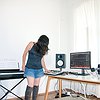Name: Daniela Orvin
Occupation: Sound Artist, photographer
Current Release: Home on Seasides on Postcards
Recommendations: As music is my biggest passion and I use it the most I will recommend two music albums:
Sven Laux - Paper Streets (Dronarivm).
Talking about the development of sound, I heard Sven's Paper Streets before I got to know him and really admired this album - beautiful ambient / modern classical music and I'mpressive soundscapes and sound design which became straight away a sound reference for me on my monitors. While recently becoming also a friend and a musical partner I have also discovered what a wonderful and generous human being he is in addition of him being a great musician.
Andrew Sherwell - Ektenia ( Shimmering Moods Records)
Freshly pressed and released I heard this album yesterday and was blown away. I call it beautiful pain. Such accurate and emotional (at least for me) ambient music, dark and beautiful. It really speaks to me and I'm very inspired by it now. Pure quality.
If you enjoyed this interview with Daniela Orvin, keep up with her work on her website, facebook account and bandcamp site.
When did you start writing music and what or who are your early passions and influences what was is about music or sound that dew you to it?
I guess music was my biggest passion from a very early age, I would say it's practically my passion since I was born. My father is a music fanatic and always has been. After I was born my mom was always asking him to lower the music volume so the baby could sleep, but he told her I should get used to it, and I guess I did. In the 70-80s he was a DJ throwing private parties at our home basement which he converted to a fully equipped discotheque. So I was lucky enough to be able to listen and dance to music from a very early age on excellent sound systems. Therefore I'm also really picky about sound and how it is delivered. I started playing the piano at age 6 and it was my wish and passion and my saviour all through my childhood. I quit when I was 14 because of a traumatic experience while playing at a concert. I was sure I wasn't not good enough and went into other directions, although I stayed a passionate music lover and dancer/clubber and I also worked for some years in record stores. I got back to the piano 4 years ago, then I also started writing my own music which I always secretly wanted to do but didn’t have the courage to for too long. I always expressed my self through art which was one of the degrees I learnt in University, so now I'm expressing myself also through music and it feels amazing, as if I'm truly back home. I feel really lucky to be able to do this now and also to play music of amazing classical composers such as Chopin, Mozart, Beethoven and Bach. That is such a privilege and an honour.
For most artist originally is first originality by a phase of learning and ofter emulating others. What was this like for you? How would you describe your own development as an artist and the transition towards your own voice? What is the relationship between copying learning and your own creativity?
I didn’t become an artist or a musician to imitate and copy others. Also when I was studying, I was always searching and finding my own authentic voice. Maybe this has to do with my personality as well. I'm not a competitive person so I was always trying to find some kind of a deserted niche I could feel comfortable in. I could of course be inspired by musicians or artists I admire, and I'm aware that I didn’t invent this chord or that chord progression. It has all been done already one way or the other, but I won’t copy or imitate, what's the point? I have much to say and to give from my own self. I did take some music lessons two years ago. Mostly basic private lessons in music composition. I was really afraid to touch my voice and influence it with academy values. I'd done that with photography and after studying at university I felt that something of my freedom, authenticity and experimental voice had been lost during the study process and I didn’t want this to happen to me with music. I wanted to keep it pure and intuitive as much as I could. But I also think that learning the basics is really important. It's not possible to break the rules if one doesn’t know the rules first.
What were your main compositional compositional and production challenges in the beginning and how have they changed over time?
I guess my main challenge was to get out of and develop the loop I've just written. If I like a chord progression, I can listen to it or 1287508 times without getting bored or getting enough of it but it turns out that not everyone has the patience to just listen to the same loop 2338475 times. So it needs some processing, even on an almost unconscious level so as not to bore the ears. Through a learning process and practise I managed to get experienced and now it's natural and obvious.
What was your first studio like? How and for what reasons has your set up evolved over the years and what are currently some of the most important pieces of gear for you?
My first studio was also at home. I just had my laptop, small monitors, headphones and a sound card. I didn’t even have a keyboard and just used the computer keyboard to make music. Actually really nice things came out at those times, considering it was the beginning. Today my studio gear has grown but actually not that much, it is still a very minimalistic setup. I really think about it before I buy something. Also in general, I'm not a big consumer. and less is more in my opinion. So I have now some good second hand monitors, my wonderful and amazing Yamaha e-piano, the same sound card I had when I was just starting, my oldish laptop and my amazing Minilogue which is my latest purchase. I'm very happy with what I have and it's sufficient for me to make music. I'm thinking of getting a drum machine to develop my sound, but still need to research and search for the perfect one for me. And that might take a while.
How do you make use of technology? In terms of the feedback mechanism between technology and creativity, what do humans excel at, what do machines excel at?
Machines really help me to express my ideas and feelings while making music, but first of all there is a brain and there is a soul, there is the human touch that makes the same machine sound different with each and every person, as every person is unique and different.
Production tools, from instruments to complex software environments, contribute to the compositional process. How does this manifest itself in your work? Can you describe the co-authorship between yourself and your tools?
I'm not picky when it comes to digital sound or analog sound. I use what serves the music best, although I have much more fun when it comes to analog or physical instruments. But I surely write music for a specific sound that is created by me first. That is, I'm inspired by the sound itself and write music and a melody for it. So I usually don’t write a melody on the piano for instance and then search for the sound. Rather, I first create a sound that I like and then compose the music specially for this sound.
Collaborations can take many forms. what role do they play in your approach and what are your preferred ways to engaging with other creatives through, for example, file sharing, jamming or just talking about ideas?
I actually thought I'm not built for collaborations and jamming until 6 months ago. But then I got an offer from Sven Laux who is a musician whom I really admire, to write an album together, and it was really fun. I was also happy with the outcome. It was really good and convenient to share and exchange files and ideas and I can’t wait until this release is out next year. We also became good friends and he released my new album which I wrote especially for his new label ‘seasides on postcards’ so I'm really happy and thankful about this collaboration.
Two weeks ago I had my first jam in my studio with Ronen Peri who is an extremely talented pianist and friend, who came from abroad for a short visit. It actually went perfect and very smooth. Luckily I also recorded everything so hopefully we will release this fluent 40 mins jam piece one day.



